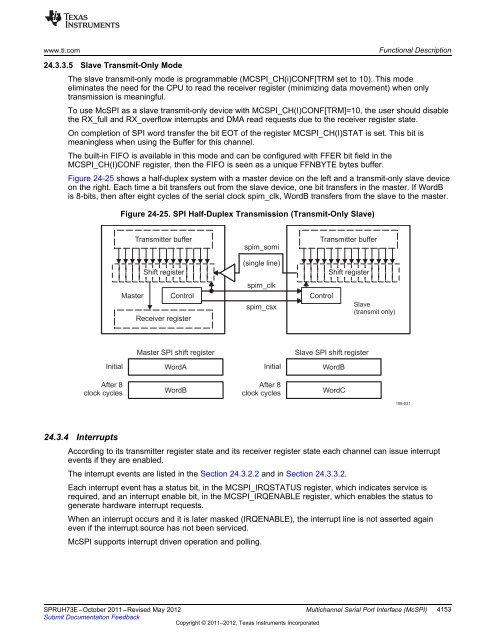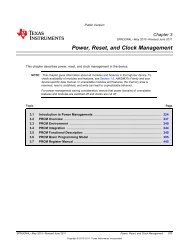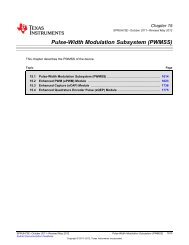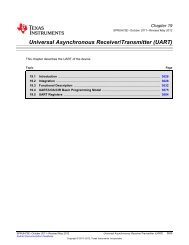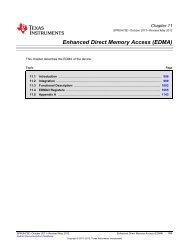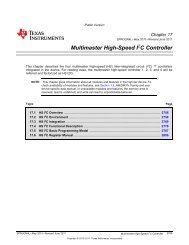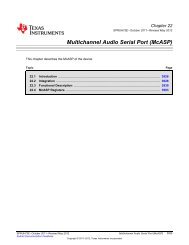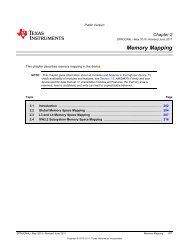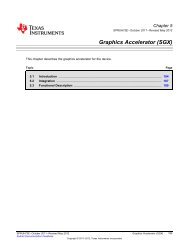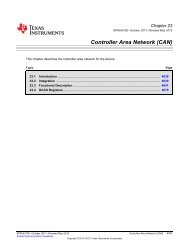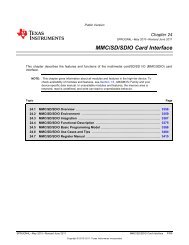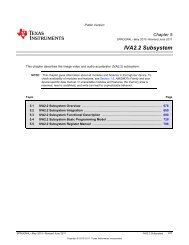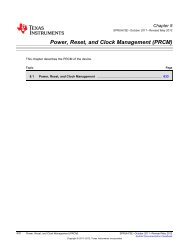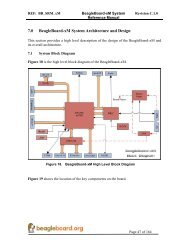Chapter 24 Multichannel Serial Port Interface (McSPI).
Chapter 24 Multichannel Serial Port Interface (McSPI).
Chapter 24 Multichannel Serial Port Interface (McSPI).
Create successful ePaper yourself
Turn your PDF publications into a flip-book with our unique Google optimized e-Paper software.
www.ti.com Functional Description<br />
<strong>24</strong>.3.3.5 Slave Transmit-Only Mode<br />
The slave transmit-only mode is programmable (MCSPI_CH(i)CONF[TRM set to 10). This mode<br />
eliminates the need for the CPU to read the receiver register (minimizing data movement) when only<br />
transmission is meaningful.<br />
To use <strong>McSPI</strong> as a slave transmit-only device with MCSPI_CH(I)CONF[TRM]=10, the user should disable<br />
the RX_full and RX_overflow interrupts and DMA read requests due to the receiver register state.<br />
On completion of SPI word transfer the bit EOT of the register MCSPI_CH(I)STAT is set. This bit is<br />
meaningless when using the Buffer for this channel.<br />
The built-in FIFO is available in this mode and can be configured with FFER bit field in the<br />
MCSPI_CH(I)CONF register, then the FIFO is seen as a unique FFNBYTE bytes buffer.<br />
Figure <strong>24</strong>-25 shows a half-duplex system with a master device on the left and a transmit-only slave device<br />
on the right. Each time a bit transfers out from the slave device, one bit transfers in the master. If WordB<br />
is 8-bits, then after eight cycles of the serial clock spim_clk, WordB transfers from the slave to the master.<br />
Initial<br />
After 8<br />
clock cycles<br />
<strong>24</strong>.3.4 Interrupts<br />
Figure <strong>24</strong>-25. SPI Half-Duplex Transmission (Transmit-Only Slave)<br />
Transmitter buffer<br />
Shift register<br />
Master Control<br />
Receiver register<br />
Master SPI shift register<br />
WordA<br />
WordB<br />
spim_somi<br />
(single line)<br />
spim_clk<br />
spim_csx<br />
Initial<br />
After 8<br />
clock cycles<br />
Transmitter buffer<br />
Control<br />
Shift register<br />
Slave SPI shift register<br />
WordB<br />
WordC<br />
Slave<br />
(transmit only)<br />
According to its transmitter register state and its receiver register state each channel can issue interrupt<br />
events if they are enabled.<br />
The interrupt events are listed in the Section <strong>24</strong>.3.2.2 and in Section <strong>24</strong>.3.3.2.<br />
Each interrupt event has a status bit, in the MCSPI_IRQSTATUS register, which indicates service is<br />
required, and an interrupt enable bit, in the MCSPI_IRQENABLE register, which enables the status to<br />
generate hardware interrupt requests.<br />
When an interrupt occurs and it is later masked (IRQENABLE), the interrupt line is not asserted again<br />
even if the interrupt source has not been serviced.<br />
<strong>McSPI</strong> supports interrupt driven operation and polling.<br />
SPRUH73E–October 2011–Revised May 2012 <strong>Multichannel</strong> <strong>Serial</strong> <strong>Port</strong> <strong>Interface</strong> (<strong>McSPI</strong>)<br />
Submit Documentation Feedback<br />
Copyright © 2011–2012, Texas Instruments Incorporated<br />
108-031<br />
4153


